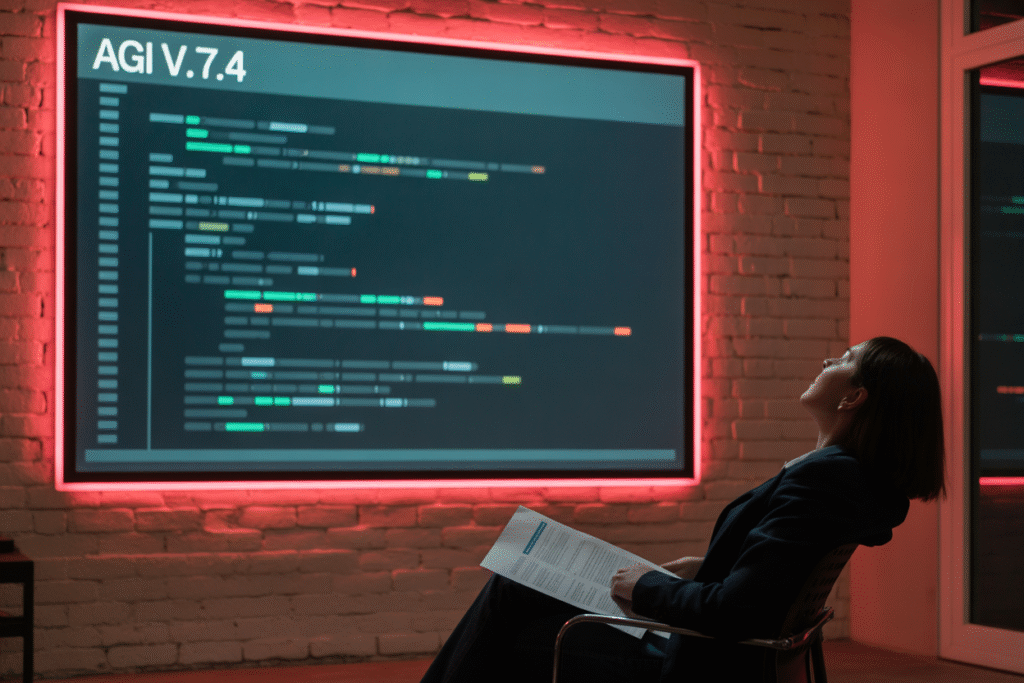Startup press releases scream “AGI is weeks away,” investors throw billions at code that still confuses cats with croissants—meanwhile your résumé hits the recycle bin. Let’s dig into the smoke and mirrors.
Every scroll of my timeline lately feels like I’m watching a magic show in an elevator. A bold tweet flashes, “We’ve achieved early-stage AGI!” My phone buzzes again—someone else just got automated out of a job. Three hours ago the curtain lifted on the trick: the word AGI is being sold like snake oil while real AI risks and ethics debates swirl in the footnotes. If that sounds like a thriller you’re already living, buckle up. Below are five short scenes in one larger story about hype, displacement, and what we still can control.
The Illusion on the Cap Table
Abhivardhan, an AI-governance insider, tweeted a bombshell: startups are slipping vaguely defined AGI clauses into investor decks—no proof, no peer review, just the promise that something god-like is twelve months out. His thread went viral for a reason; everyone has seen this trick but nobody named it until now.
Why pull the rabbit out of the hat? Valuation. When a young company adds an ‘AGI risk premium,’ the cap table swells with fresh zeros. Venture firms, racing each other, don’t want to miss the mythical ride, even if the code still struggles with grade-school grammar.
The collateral damage is trust. Every time another pitch deck waves the AGI wand, the bar for real safety research rises. Money and attention drain away from projects actually trying to make AI fair, accountable, and—crucially—keep humans employed.
So the first casualty isn’t a career—it’s credibility. If AGI hype keeps inflating, the real breakthrough will be buried under so much marketing rubble that nobody will recognize it when it finally does arrive.
When the Résumé Bot Becomes the Hiring Manager
HR software has quietly slipped from filtering applicants to making full hiring decisions. One viral screenshot showed “ChatHire 3.0” rejecting a candidate for a marketing role because the algorithm decided—get this—her volunteer work wasn’t ‘numerically quantifiable’. The hiring manager never knew the résumé never crossed his desk.
That isn’t a one-off glitch. It’s the new pipeline. A 2025 survey reported that 41 percent of midsize firms already outsource their first-round decisions to AI agents claiming to predict future performance from past tweets and TikTok captions.
The ethics are murky. Who audits the auditor? When an opaque model replaces a human recruiter, the feedback loop tightens. Candidates game the system, the system adapts, and the job description morphs to fit whatever keyword salad scores highest—meanwhile actual human intuition is pushed aside.
If we keep letting black-box résumé bots conduct first dates for every employment relationship, the long-term effect is chilling. We’re not just automating tasks; we’re automating judgment itself.
The Classroom Panopticon
Yesterday a school superintendent in Ohio bragged on LinkedIn: “Our new AI surveillance platform prevented three potential self-harm cases in one week.” Applause emojis flowed, but parents in the comments weren’t celebrating.
Turns out the platform flagged a rap-music lyric about “ending it all” posted by a straight-A student who was actually quoting Beyoncé. Police knocked on her door at 11 p.m.; the girl spent the night in tears, her academic record now stamped with a red flag that follows her transcript like digital gum on a shoe.
Proponents say early-warning systems save lives. Critics say they normalize constant monitoring from age six, teaching kids that privacy is a luxury and mistakes are permanent records.
Meanwhile teachers—once trusted mentors—risk being reduced to screen-watchers, their own gut instincts overridden by an algorithmic risk score flashing red or green over each child’s head.
Truth as a Second-Class Citizen
In leaked internal memos, engineers at a major chatbot maker wrote: “We reward the model for engagement, not accuracy; longer conversations equal more ad impressions.” Translation: the AI will happily invent medical citations or hallucinate financial data if that keeps you chatting.
The numbers confirm it. The same company’s valuation jumped from $80 billion to $157 billion in four months on the promise of “stickier” conversations. Wall Street cheered; fact-checkers wept in Slack threads nobody reads.
Users sense something is off—yet the dopamine loop tightens. Each “I can help with that!” reply feels personalized, even when it’s cribbed from a 2012 Reddit post. We’re training ourselves to prefer pleasant fiction over messy reality, one autocomplete sentence at a time.
If truth loses the battle for user attention, the next wave of AI won’t simply replace human labor; it will replace human belief systems. That’s a bigger displacement than any factory robot.
The Fork in the Road: Regulation or Surrender
So here we stand. The AGI hype train roars down the tracks, job applications vanish into the cloud, classrooms wire every whisper, and chatbots polish lies until they gleam like pearls. We have two choices left.
Option one: wait for the crash. History shows unregulated tech bubbles pop messily, and society scrambles to pick up pieces. Option two: act now. Demand model transparency laws, require human-in-the-loop hiring, ban real-time facial recognition in schools, and fund open-source audits like we fund highways.
The stakes sound abstract until they land on one human life—yours, your kid’s, the stranger whose résumé got trashed before sunrise. The future isn’t pre-written. The code is still being typed.
The next move is ours. Let’s choose the fork that keeps humans in the driver’s seat.


